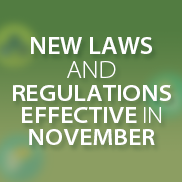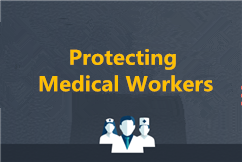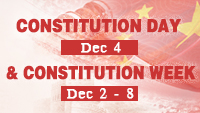Annual Report on Promoting the Rule of Law in China(2016)
V. Legal Guarantee for Human Rights
China continued to give more legal guarantee for human rights, the living standards and quality of the people’s life were further improved, their economic, social and cultural rights were effectively strengthened and their citizen rights and political rights were firmly guaranteed. The socialist cause of human rights with Chinese characteristics rose to a new height.
(1) The right to life and health was safeguarded
——Formulating the Programme for Healthy China 2030. The programme makes it clear that the good health of the whole people is the fundamental aim of building healthy China. It must focus the work on the whole population and the life cycle, provide fair, systematic and continuous service for health, do a good job of the health work for women, children, elderly, disabled persons and low income earners, strengthen effective intervention in the main health problems in the different periods of the life and the main affecting effects to benefit the whole population over the whole life cycle to achieve the good health of the whole people at a still higher standard. The programme centers on the factors affecting health (including biological factors of heredity and psychology, natural and social factors, medical and health service factors and the factors of life and behaviors), and outlines the five strategic tasks of popularizing the healthy life, optimizing the health service, improving the health security, constructing a health environment and developing the health industry, and the goals of “three steps for Healthy China: the main health standard for 2020 is targeted at that in the frontline of middle and high income countries”, “the main health target for 2030 is aimed at that in high income countries”, and “by 2050, Healthy China will be built to comply with the standard of a modern socialist country”.
——Deepening the reform of the medical and public health system. The State Council issued the Opinions on Integrating the Basic Medical Insurance System for Urban and Rural Residents in January. It made clear that the basic medical insurance system for urban residents and the new type rural cooperative medical system would be integrated to establish a unified basic medical insurance system for urban and rural residents. The State Public Health and Family Planning Commission, the State Council Office of Poverty Alleviation and thirteen other central departments jointly issued the Guiding Opinions on Implementing the Health and Poverty Alleviation Project in June to strengthen the work of health and poverty alleviation. It says that every person in the poor areas will enjoy the basic medical and health service by 2020. The General Office of the State Council issued the Guiding Opinions on Promoting and Standardizing the Application and Development of the Big Data for Public Health and Medical Service in June, and made arrangements for 14 major tasks and major projects to solidify the application foundation, comprehensively deepen application, standardize and promote the “Internet+ Medical Service for Health”. The State Development and Reform Commission, the State Public Health and Family Planning Commission, the Ministry of Human Resources and Social Security and the Ministry of Finance jointly issued the Circular on the Distribution of the Opinions on Promoting the Reform of the Prices of Medical Services in July to promote the classified management of the prices of medical services, making clear that public medical institutions shall mark the mandatory prices for the basic medical services they provide. The Leading Group of the State Council for Deepening the Reform of the Medical Service and Health System issued the Some Opinions on Further Popularizing the Experience in Deepening the Reform of the Medical Service and Health System in November, putting forward the measures to promote the development of the medical reform in eight aspects of establishing the joint work mechanism for medical service, medical insurance and medicine, improving the new mechanism for the operation of public hospitals, strengthening the external restraint on the medical service, establishing the modern hospital management system, accelerating the establishment of the classified consultation system and making full use of Internet technologies.
——Strengthening supervision over food safety. The State Food and Drug Administration published the spot check of the food safety under supervision in 2015 in February. Among the 172,310 food samples checked throughout the country, there were 5,541 samples not up to the standard. The standard rate was 96.8%. As a whole, the food safety situation was stable while tending to be better. The General Office of the State Council issued the Major Arrangements for the Food Safety Work for 2016 in May. It improved the mandatory standards, required strict prevention of inferior-quality materials from sources, strict supervision and control over the production process and severe punishment for law violations to accelerate the improvement of the unified and authoritative supervision and control system.
(2) Household Registration and the Reform of Household Registration System
——The General Office of the State Council issued the Opinions concerning the Issue of Solving the Problem of Household Registration for Persons without Registered Residence in January. It required local governments to further improve the household registration policy, prohibited the establishment of any preconditions that did not conform to the provisions on household registration, strengthen the management on household registration and earnestly guarantee that every citizen has one permanent residence and make efforts to reach the targets of the accuracy, uniqueness and authority of the identity number of the households and citizens of the whole country. The Opinions prescribed the measures for the household registration of persons without registered residence who do not conform to the family planning policy, persons without registered residence who do not have medical birth certificates, adopted persons without registered residence who have not gone through the formalities for adoption and other persons without registered residence.
——By September, 2016, the 31 provinces, autonomous regions and municipalities throughout the country had all issued plans for the reform of the household registration system in accordance with the Opinions of the State Council on Further Promoting the Reform of the Household Registration System, and all cancelled rural household residence. The dual urban and rural household residence system became part of the history. The General Office of the State Council issued the Plan for the Settlement of 100 Million Residents without Registered Residence in the Cities, and planned to accelerate the removal of the barrier for the transfer of the household registration in the areas adjoining cities and the countryside during the Thirteen Five-Year Plan period and further improve the supplementary policies, raising the urbanization rate of the registered residence by an average annual rate of more than one percentage point, an average transfer of more than 13 million persons a year, and raising the national urbanization rate of the registered residence to 45% by 2020, and the difference between the urbanization rate of the registered residence and the urbanization rate of the permanent population in all regions will be reduced by more than two percentage points as compared with 2013.
(3) Establish and Improve the Social Security System
——The State Council issued the Opinions on Further Improving the System of Assisting and Providing for Extremely Poor Persons in February. It calls for the establishment of a national system, connected with policies and operated up to standard, of assisting and providing for extremely poor persons in compliance with the economic and social development level under an overall plan with due consideration for both urban and rural conditions, with the target of helping extremely poor persons in the cities and the countryside to help them overcome dire difficulties and meet their basic needs, by giving play to the role of social forces under the guidance of the government.
——The State Public Health and Family Planning Commission, the State Development and Reform Commission, the Ministry of Civil Affairs, the Ministry of Finance and three other central departments jointly issued the Circular on Doing a Good Job of the Critical Illness Insurance work for Urban and Rural Residents in 2016, requiring the local governments to raise more funds for critical illness insurance, and use one quarter of the newly-added government subsidy of 40 yuan per person for the basic medical insurance in 2016 for critical illness insurance, and encouraging local governments to find specific measures to tilt properly to the extremely poor persons, and adopt the tilting payment policy for poor people in the urban and rural areas, including the poor people on files, extremely poor persons and families enjoying the minimum guarantees for allowances.
——The General Office of the State Council retransmitted the Guiding Opinions on Ensuring the Effective Connection between the Rural Minimum Guaranteed Allowance System and the Poverty Alleviation Policy in September. It pointed out that it is essential to execute the basic plan for the targeted measures to alleviate poverty in the light of local conditions. By connecting the rural minimum guaranteed allowance system with the poverty alleviation policy effectively, the local governments shall make concerted efforts to alleviate poverty and provide policy guarantee for rural poor population who conform to the minimum guaranteed allowance criteria and ensure that by 2020, poverty would be alleviated for the whole rural poor population according to the current criteria prescribed for poverty alleviation.
(4) Guarantee the Right to Education
The State Council issued Some Opinions on Making Overall Planning for Promoting the Reform and Development of the Urban and Rural Compulsory Education in County Cities in July. It required the local governments to accelerate the narrowing of the difference between urban and rural education, promote educational fairness and make overall planning for promoting the integrated reform and development of the urban and rural compulsory education in county cities in accordance with the target of building a moderately prosperous society in an all-round way. The Opinions proposed the uniform criteria for the construction of schools for urban and rural compulsory education, uniform criteria for the specified number of teachers, uniform basic quotas for per student public expenses, uniform criteria for the allocation of basic equipment and the extension of the policy of gradually exempting extra fees and book expenses and providing boarding allowances to students from poor families to all county cities and villages of the country, and by the year of 2020, the barriers for the dual structure in the cities and the countryside would be eliminated in the main, compulsory education and the development of urbanization would be basically coordinated, geographical distribution of schools in cities and the countryside would be more rational, big classes were basically eliminated, notable progress be gained in the construction of standard schools, the allocation of teachers in cities and the countryside basically balanced, the treatment for rural teachers be steadily raised, the job attraction be increased, the quality of rural education obviously improved, the nine-year compulsory education be consolidated in 95% of the rural schools, the compulsory education in the county areas be developed harmoniously, and the balance of the basic public educational service be basically achieved.
(5) Guarantee for the Right of Children
——The State Council issued the Opinions on Strengthening the Work of Cherishing Love and Care for and Protecting Children Left Behind in Rural Areas in February. It pointed out that it is the important duty and responsibility of the governments at all levels and the common responsibility of families and the whole society to strengthen the work of cherishing love and care for and protecting children left behind in rural areas and safeguard the legitimate rights and interests of minors. It said that the point of departure and the goal of the work were to promote the healthy growth of minors. It would be necessary to improve the laws, regulations, systems and mechanisms, strengthen the subject responsibility of family guardianship, give more care and protection to children, gradually reduce the number of children left behind in rural areas and ensure the effective guarantee of their safety, good health, education and other rights and interests.
——The Ministry of Civil Affairs established a division for the protection of minors (left-behind children) in February. Its responsibility and duty were to establish and improve the work mechanism and service system for the protection of minors, make a comprehensive investigation to improve the management of information on left-behind children and catenate the superior resources of civil affairs of social assistance, social welfare, social groups, community construction and social work to establish the coordination mechanism of the leadership and the cooperation mechanism of the joint actions of different departments for the protection of minors to promote the orderly connection of family protection, school protection, social protection and judicial protection. The Ministry of Civil Affairs and 26 other central departments established an inter-departmental joint meeting system for the work of care and protection of left-behind children in the rural areas to coordinate the work of giving care and protection for children left behind in rural areas throughout the country.
——The State Council issued the Opinions on Strengthening the Work of Safeguarding Children in Difficulty in June. It strengthened the classified guarantee for children in difficulty and established and improved the work system of safeguarding children in difficulty in the light of the outstanding difficulties confronted by children in difficulty and the outstanding problems in the work of safeguarding children.
(6) Safeguarding the Right of Disabled People
——The State Council issued the Programme for Accelerating the Course of Promoting Moderately Prosperity for Disabled People under the Thirteenth Five-Year Plan in July. It required the local governments to formulate the local Thirteenth Five-Year Plans for the cause of disabled persons or accelerate the course of making disabled persons moderately well-off, and include the main tasks and indices in the local general plans for economic and social development. The work committees for disabled persons and other related departments of the local governments at all levels should supervise, monitor, inspect and follow up the implementation of the plans.
——The General Office of the State Council issued the Action Plan for the Prevention of Disability (2016-2020) in September. It says that it is necessary to effectively control disability caused by birth defects and developmental disorder, to prevent and control disability due to illness and effectively reduce disability from injuries to effectively reduce and control the occurrence and development of disability of the Chinese population in all periods of the growth from birth to aging in the next five years. It is necessary to strengthen supervision over work safety, road traffic safety control, supervision over the food and drug safety, environmental protection and pollution control, and strengthen the ability to prevent and reduce disasters so as to reduce disability from injuries. This is the first national class plan in the field of preventing of disability.
(7) Guarantee for Human rights in the Judicial Procedure
——Guarantee the right of the parties in law suits. The Supreme People’s Procuratorate issued the Provisions on Cases Handled by People’s Procuratorates for the Examination of the Necessity of Detention (for trial implementation) in January. It says that an arrested criminal suspect or defendant may apply to a procuratorate for the examination of the necessity of detention. If the procuratorate believes that detention is unnecessary after examination, it shall suggest that the case handling organ release the detained suspect or defendant or changes the compulsory measure. The Supreme People’s Court issued the revised Court Rules of the People’s Courts of the People’s Republic of China in April. It made clear that the defendant or appellant in custody shall not wear the identification clothes of the supervision organ during the court session nor use fetters for the defendant or appellant under normal circumstances. The Supreme People’s Court, the Supreme People’s Procuratorate, the Ministry of Public Security, the Ministry of State Security, and the Ministry of Justice jointly issued the Opinions on Promoting the Reform of the Criminal Procedure System with Adjudication as the Centre. It explicitly stated that judicial organs shall improve the interrogation system, prevent extortion of a confession by torture, and not force anyone to establish one’s guilt. It strictly requires the interrogation of a criminal suspect in a standard place for interrogation, the synchronous audio-video recordings throughout the entire process of interrogation strictly in accordance with the laws, and gradually making synchronous audio-video recordings throughout the process of interrogation in all cases.
——Improve the systems for judicial compensation and assistance. The Supreme People’s Court and the Supreme People’s Procuratorate issued the Interpretation concerning Some Issues on the Application of the Law to Handling Cases of Criminal Compensation. It defines the connotation of criminal compensation, clarifies the circumstances for the termination of the investigation of criminal responsibility, the circumstances for infringement on property right, acceptance of an overdue application for compensation under special circumstances, illegal criminal detention and the scope of retrial for innocence compensation, clarifies the application of the exception clause, clarifies the subject of legal relationship for compensation, reasonable determination of standards for compensation, standardizes the time basis for the calculation of compensation, and clarifies the validity of the compensation decision. The Supreme People’s Court issued the Interpretation concerning Some Issues on the Application of the Law to Hearing Civil and Administrative Cases of Judicial Compensations in September. It included moral damage in the noncriminal judicial compensation sphere for the first time and improved the scope of application of moral damage for state compensation. The Supreme People’s Procuratorate issued the Detailed Rules for the Work of State Judicial Assistance (for trial implementation) in July. It clarifies that the state judicial assistance work is a supplementary relief measure taken by procuratorates for parties who could not receive valid compensation through procedures in the course of handling cases for criminal offences or civil infringements. It prescribes the seven types of specific circumstances under which the procuratorates should give assistance.
——Standardize police power. The Ministry of Public Security issued the revised Provisions on the Accountability for Errors in the Law Enforcements by People’s Police of Public Security Organs. It says that a wrong case caused intentionally or by major negligence shall be investigated for the liability of the person responsible for the error in law enforcement, regardless of his/her organization, post, reassignment or retirement.



